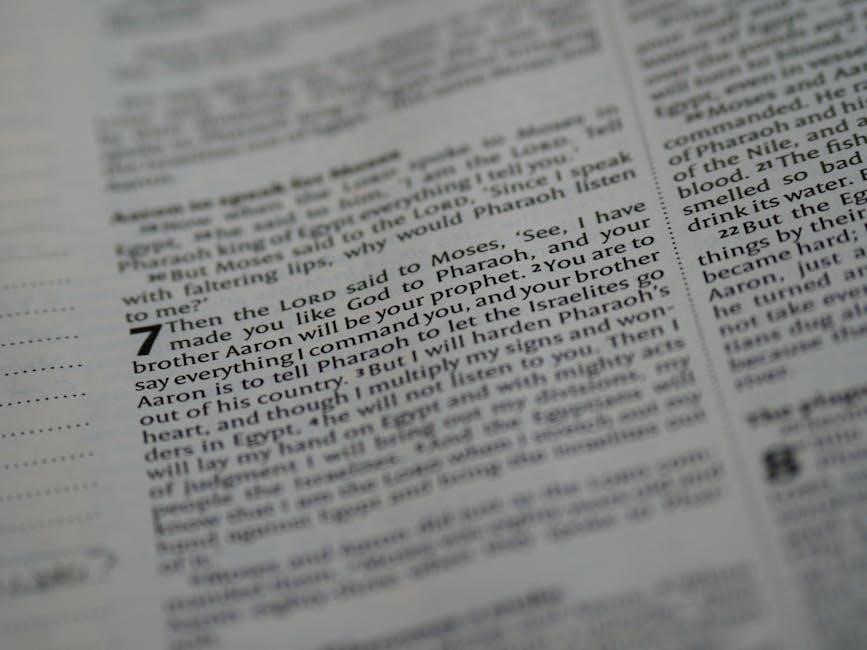The Book of the Wars of the Lord is a mysterious, ancient text referenced in the Old Testament, specifically in Numbers 21:14. This enigmatic book, mentioned only once in the Bible, is believed to be a collection of poems and prose documenting Israel’s battles and God’s divine interventions. Its significance lies in its historical and theological insights, though its full contents remain unknown, sparking curiosity and debate among scholars and readers alike.
1.1. Overview of the Book’s Significance
The Book of the Wars of the Lord holds profound significance as a historical and theological text, offering insights into Israel’s early history and God’s role in their battles. Referenced in Numbers 21:14, it is believed to contain poetic and narrative accounts of divine interventions, celebrating Israel’s victories. Scholars suggest it may include victory songs and prose, making it a valuable yet enigmatic source for understanding ancient Israelite traditions. Its mysterious nature has sparked debate, but its influence on biblical history and theology remains undeniable, captivating both religious and academic interest for centuries.
1.2. Historical Context and Relevance
The Book of the Wars of the Lord is deeply rooted in Israel’s early history, particularly during their journeys after the Exodus. It likely documented key battles, such as those against Sihon and Og, which were pivotal in establishing Israel’s presence in Canaan. The reference to the Arnon River suggests its role in defining territorial boundaries, emphasizing its historical relevance. This text not only chronicled military victories but also highlighted God’s involvement, making it a significant source for understanding Israel’s identity and divine covenant during the formative periods of their history.
Biblical References to the Book of the Wars of the Lord
The Book of the Wars of the Lord is referenced in Numbers 21:14, citing its account of battles and divine acts, while the Septuagint provides additional context.
2.1. The Mention in Numbers 21:14
Numbers 21:14 references the Book of the Wars of the Lord, citing its account of battles and divine acts. The verse states: “Therefore it is said in the Book of the Wars of the Lord: ‘Waheb in Suphah and the wadis of the Arnon.'” This passage highlights specific events, including the defeat of Sihon and Og, showcasing God’s role in Israel’s victories. Scholars interpret this citation as evidence of the book’s historical significance, though its full content remains unclear. This single mention has sparked extensive debate and speculation about the book’s nature and purpose.
2.2. Other Potential Allusions in the Old Testament
Beyond Numbers 21:14, scholars suggest other Old Testament passages may allude to the Book of the Wars of the Lord. For instance, the Book of Jashar, mentioned in Joshua 10:12-13 and 2 Samuel 1:18, shares similarities, leading some to speculate a connection. Additionally, poetic sections like Exodus 15:1-18 and Judges 5:1-31, which celebrate divine victories, may reflect themes from the Book of the Wars of the Lord. These potential allusions hint at a broader literary tradition of recording Israel’s battles and God’s interventions, though direct links remain unclear.

Content and Structure of the Book
The Book of the Wars of the Lord contains a mix of poetry and prose, detailing ancient battles and God’s interventions in Israel’s history, with victory songs and narratives.
3.1. Literary Forms and Poetic Elements
The Book of the Wars of the Lord features a blend of poetic and prose elements, including victory songs and narratives. Poetic sections likely celebrate Israel’s triumphs, with lyrical expressions of God’s power. These literary forms, such as parallel structures and rhythmic phrases, emphasize divine intervention in battles. The text may include hymns and elegies, reflecting ancient Hebrew literary traditions. Such poetic elements serve to inspire and commemorate Israel’s victories, while prose sections provide historical context. This mix of styles underscores the book’s dual role as both a historical record and a theological testament to God’smighty acts.
3.2. Prose and Narrative Sections
The prose sections of the Book of the Wars of the Lord provide detailed accounts of historical battles and events, emphasizing God’s role in Israel’s victories. These narratives likely include descriptions of battles against Sihon, King of the Amorites, and Og of Bashan, highlighting divine intervention. The prose may also contain geographical and contextual details, such as the Arnon Border Song, which establishes boundaries and recounts Israel’s journey. These sections blend historical storytelling with theological themes, showcasing God’s covenant faithfulness and power in shaping Israel’s destiny through military triumphs and territorial expansion.
The Book of the Wars of the Lord and Other Ancient Texts
The Book of the Wars of the Lord shares similarities with other ancient texts like the Book of Jashar, which also contains poetic accounts of Israel’s history and battles.
4.1. Comparison with the Book of Jashar
The Book of the Wars of the Lord and the Book of Jashar share similarities as ancient texts containing poetic accounts of Israel’s battles. Both are referenced in the Old Testament, with the Book of Jashar quoted in Joshua 10:12-13 and 2 Samuel 1:18. While the Book of Jashar is more detailed in its narratives, the Book of the Wars of the Lord focuses on divine interventions in Israel’s history. Scholars debate whether these texts are distinct or overlapping, but both highlight victories and theological themes, providing insights into Israel’s early traditions and literary styles.
4.2. Similarities to Other Lost Biblical Books
The Book of the Wars of the Lord shares similarities with other lost biblical texts, such as the Book of Jashar and the Book of YHWH’s Battles; These books, like the Book of the Wars, were likely collections of poetic and prose accounts documenting Israel’s history and divine interventions. They often included victory songs and narratives of battles, preserving theological themes and historical events. While their exact contents remain unclear, scholars note that these texts reflect early Israelite traditions and literary styles, offering insights into the nation’s spiritual and cultural heritage.

Historical Battles Documented in the Book
The Book of the Wars of the Lord details battles against Sihon, King of the Amorites, and King Og of Bashan, highlighting Israel’s victories and divine intervention.
5.1. The Battle Against Sihon, King of the Amorites
The Book of the Wars of the Lord chronicled the decisive battle against Sihon, King of the Amorites, a pivotal event in Israel’s conquest of Canaan. This victory, facilitated by God’s intervention, allowed the Israelites to seize Sihon’s kingdom, including the strategic city of Heshbon. The battle’s significance is underscored in Numbers 21:21-25, marking a turning point in Israel’s journey, demonstrating divine favor and military prowess. It symbolizes God’s faithfulness in fulfilling promises of land inheritance, reinforcing Israel’s identity as a chosen people.
5.2. The Defeat of King Og of Bashan
The Book of the Wars of the Lord likely detailed the defeat of King Og of Bashan, a powerful ruler whose dominion included strategic territories east of the Jordan. Numbers 21:33-35 and Deuteronomy 3:1-11 recount Israel’s victory over Og, emphasizing God’s role in securing the triumph. This conquest marked another milestone in Israel’s journey, showcasing divine authority and the fulfillment of promises to occupy the land. While the Book’s exact description is unknown, its inclusion of such pivotal battles highlights its thematic focus on God’s sovereignty and Israel’s divine mandate.
Theological and Spiritual Significance
The Book of the Wars of the Lord underscores God’s divine sovereignty and intervention in Israel’s history, highlighting His faithfulness and power. It serves as a spiritual testament to God’s deliverance and the importance of trusting His providence, offering profound theological insights into His role in human conflicts and the fulfillment of His promises.
6.1. The Role of God in the Battles
The Book of the Wars of the Lord emphasizes God’s active participation in Israel’s battles, portraying Him as a divine warrior who intervenes on behalf of His people. The text highlights God’s power and sovereignty, illustrating how He orchestrates victories and delivers Israel from their enemies. This divine involvement underscores the theological theme of God’s covenant faithfulness and His role as the ultimate defender of His chosen people. The battles are not merely human conflicts but are framed as sacred acts, reinforcing the belief in God’s direct engagement in human history and the fulfillment of His promises.
6.2. Spiritual Lessons from the Book
The Book of the Wars of the Lord offers profound spiritual lessons, emphasizing trust in God’s sovereignty and divine providence. It teaches that true victory comes from reliance on God, not human strength, and highlights the importance of faith amidst adversity. The text encourages believers to recognize God’s hand in history and to trust His plan, even in uncertain times. These lessons underscore the transformative power of faith and the enduring promise of God’s presence and deliverance for His people.

Scholarly Debates and Interpretations
Scholars debate the Book of the Wars of the Lord’s composition, purpose, and possible contents, exploring its role as a historical or poetic text and its theological implications.
7.1. Views on the Book’s Composition and Purpose
Scholars have debated the composition and purpose of the Book of the Wars of the Lord, with some viewing it as a collection of victory poems and others as a historical record. Its mention in Numbers 21:14 suggests it was a source documenting Israel’s battles, possibly compiled over time. Some believe it served to celebrate divine interventions, while others argue it may have been part of a larger literary work. The exact nature and purpose remain uncertain, fueling ongoing academic discussion and speculation about its origins and function.
7.2; Discussions on the Book’s Possible Contents
Scholars speculate that the Book of the Wars of the Lord may have included poetic accounts of battles, such as the Song of the Well, and narratives of divine intervention. Some propose it contained victory songs and historical records, while others suggest it was an anthology of ancient Israelite writings. The mention of specific battles, like those against Sihon and Og, hints at detailed military accounts. Its exact contents remain unknown, but it is believed to have preserved early traditions and literary forms, offering insights into Israel’s history and faith.

The Legacy of the Book of the Wars of the Lord
The Book of the Wars of the Lord has left a lasting impact on Jewish and biblical traditions, influencing later texts and sparking modern speculation about its contents.
8.1. Influence on Later Biblical and Jewish Texts
The Book of the Wars of the Lord influenced later biblical writings, such as the Book of Joshua and Samuel, with its poetic and narrative styles. Its victory songs and battle accounts inspired similar compositions, like the Book of Jashar. This legacy is evident in the way subsequent texts reference divine intervention in battles, reflecting a shared theological and literary tradition.
8.2. Modern Interest and Speculation
The Book of the Wars of the Lord continues to captivate modern scholars and enthusiasts, sparking debates about its possible contents and significance. Many speculate that it may have included detailed battle accounts, poetic victory songs, or theological reflections. Despite its mysterious nature, the book’s mention in the Bible fuels ongoing interest, with some hoping its discovery could shed light on ancient Israelite history. Its legacy endures as a subject of fascination, blending historical intrigue with spiritual significance in contemporary discussions.
The Book of the Wars of the Lord remains a mysterious, ancient text, capturing the divine role in Israel’s history and inspiring enduring fascination and speculation.
9.1. Summary of Key Points
The Book of the Wars of the Lord is an enigmatic text referenced in Numbers 21:14, highlighting divine involvement in Israel’s history. It contains a mix of poetry and prose, documenting key battles like those against Sihon and Og. Often compared to the Book of Jashar, its exact contents remain unclear, fueling scholarly debates. Despite its mystery, the book’s significance in biblical history and its influence on later texts are undeniable, leaving it a subject of enduring fascination and speculation.
9.2. Final Thoughts on the Book’s Importance
The Book of the Wars of the Lord, though shrouded in mystery, holds profound historical and theological significance. Its mention in Numbers 21:14 and potential allusions elsewhere in the Old Testament underscore its role in documenting Israel’s divine journey. The book’s blend of poetry and prose highlights God’s active involvement in battles, offering timeless spiritual lessons. Despite its unknown contents, its influence on later biblical texts and enduring scholarly interest affirm its importance as a lost yet vital piece of religious and historical literature.